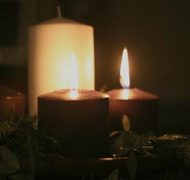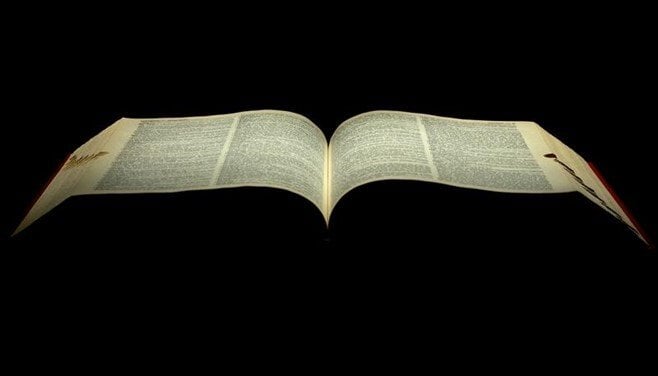Keeping Christmas Well: Taste the New Creation
Daily Reflection / Produced by The High Calling
This means that anyone who belongs to Christ has become a new person. The old life is gone; a new life has begun!
2 Corinthians 5:17
Happy New Year!
Yes, today is the first day of the new year. But it is also the eighth day in the Christian season of Christmas. So today, we continue our series in Keeping Christmas Well. At the same time, our reflection today picks up the theme of newness, focusing on how we can experience new life through Jesus Christ.
Do the things we do in this life really matter? How are we to live in light of God’s plans for the future? Second Corinthians 5 addresses questions like these, focusing on the nature of our new life in Christ.
At first glance, 2 Corinthians 5 doesn’t have anything to do with Christmas. It doesn’t mention the birth of Christ but focuses instead on his death and the new life it has brought for us. This new life reaffirms the essential value of God’s creation, including our bodies. In fact, when we stand before Christ on the day of judgment, “we will each receive whatever we deserve for the good or evil we have done in this earthly body” (5:10). Paul is not saying that our salvation hinges on our own works, of course. But there will be a time when the things we have done in this world, things that have been an expression of our physical bodies, will be evaluated. Clearly, God cares about what we do with our bodies.
When we put our trust in Christ as our Savior, everything in life begins to change. Our translation of 2 Corinthians 5:17 reads, “This means that anyone who belongs to Christ has become a new person. The old life is gone; a new life has begun.” If we were to translate this verse very literally, we might come up with something like this: “Therefore, if someone is in Christ … new creation! The old things have passed away. Look! They have become new.” Notice that the newness experienced by the Christian is not only individual or internal. The one who enters into relationship with God through Christ begins to participate in the new creation, even though continuing to live in the old creation.
How do we experience the new creation in this life, even as we hope for the fullness of the new creation that is yet to come? We live in the new creation when we gather with God’s people for worship. Or when we forgive someone who has wronged us. Or when we serve people in the power of the Spirit. Or when we live sacrificially, giving away ourselves and our stuff for others. Or when we bring the values of God’s kingdom into every facet of our lives. Or when we remain steadfast in the midst of suffering. Or when we continue to hope in God even when he seems very far away. Or when our sisters and brothers in Christ love us with a soul-embracing kind of love. Or when we feed the hungry, clothe the naked, visit the prisoners, heal the sick, and hug the lonely in the name of Jesus. Or …
Though 2 Corinthians 5 doesn’t mention the Incarnation specifically, it does express several implications of this central truth of Christmas. The fact that God came to us in a human body emphasizes the value of our bodies, a point drawn out by Paul in this chapter. The fact that God chose to become part of his creation underscores its inestimable value. It reminds us that God’s vision for the future is not the destruction of creation but its renewal. The new creation fixes, completes, and perfects this creation.
Keeping Christmas well means taking seriously what we do with our bodies, even as God takes our actions seriously. It means using our bodies for God’s service in every aspect of life. Honoring Christmas every day highlights the value of this creation, even as we anticipate the full new creation that is still to come. When we let the Incarnation guide our lives, then we will also live incarnationally as in-the-flesh instances of God’s truth and love. Our lives will communicate the good news of Christ in word and deed so that others might come to experience the new life found in Christ, the Word of God Incarnate.
QUESTIONS FOR FURTHER REFLECTION: How are you using your body as an instrument of God’s love in this world? How are you experiencing the new creation in your life today? How might you be an incarnational witness in your daily life to the good news of Jesus Christ?
PRAYER: Gracious God, thank you for the bodies you have given us and for caring about what we do with our bodies. May we use our physical strength to serve you, whether we’re using our brains to think, our fingers to type, our backs to lift, our voices to teach, or our arms to embrace.
Thank you for the blessing of the new creation and for the fact that you have made us new in Christ. Help us, Lord, to live into this newness. May we see more and more evidence of the new creation in the way we treat people, in our compassion, in our hope, in our service to others.
All praise be to you, O God, because you are making all things new … even me!
All praise be to you, O God, because you have chosen me to be part of your renewal effort.
I pray in the name of Jesus, Amen.
______________________________
Mark Roberts is the author of eight books, including No Holds Barred: Wrestling with God in Prayer. He lives in Boerne, Texas, with his wife, Linda. Their children spend most of the year away at college on the East Coast.
Best Of 2014
How do you measure a year? Days? Cups of coffee? Celebrations? Goodbyes? In 2014, something we’ve noticed at the High Calling is more and more people engaging with the message that God cares about everything in life—even the most mundane moments.
In the end, we consider 2014 a success if we have served you well, Reader. Some may consider it a strange way to show love: typing on a keyboard and submitting content into the faceless void of the Internet. This is why your actions matter so much to us. When you spend a few minutes reading an article, when you share a video or a Facebook post, we know you were inspired. When you send us a short note, you give us an opportunity to listen to you.
Thank you for reading. Thank you for sharing. Thank you for spending time with us. We hope you enjoy the Best of 2014!
Featured image by Marty Hadding. Used with Permission. Source via Flickr.









